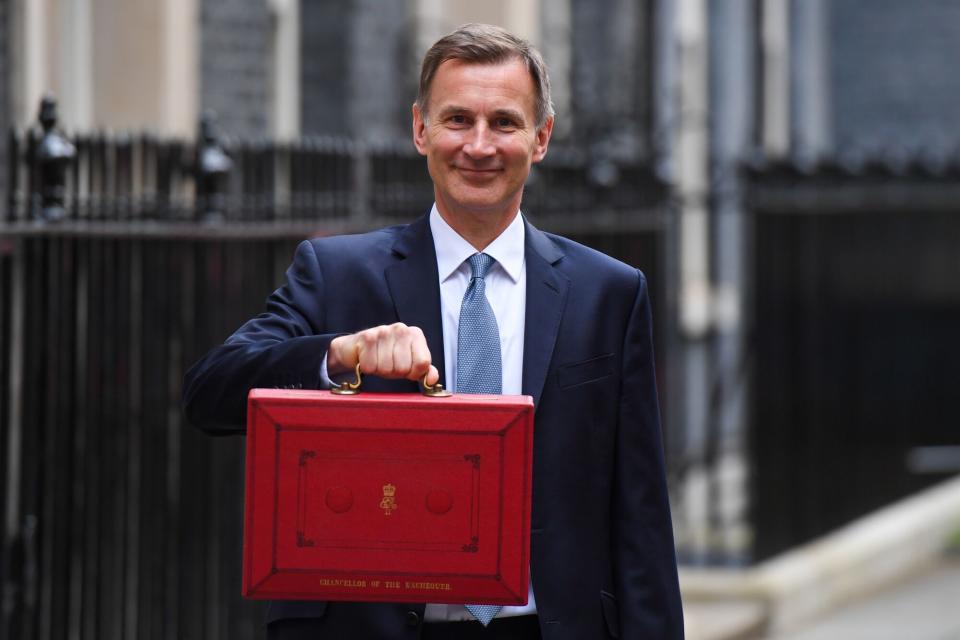UK Chancellor Hunt Will Cut National Insurance Tax in Budget, Times Says
- Oops!Something went wrong.Please try again later.
- Oops!Something went wrong.Please try again later.
(Bloomberg) -- Jeremy Hunt will cut 2 percentage points off the UK’s national insurance payroll tax in his annual budget on Wednesday, the Times newspaper reported, as the Chancellor of the Exchequer puts the finishing touches on his plans.
Most Read from Bloomberg
Egypt’s Devaluation and Record Rate Hike Put IMF Deal in Reach
Chemical Linked to Cancer Found in Acne Creams Including Proactiv, Clearasil
Hunt will present the reduction as a £900 ($1,140) benefit to the average worker when combined with the identical cut he announced to the payroll tax in his last fiscal statement in November, the Times reported Tuesday, without saying where it obtained the information. The Treasury declined to comment.
The chancellor has been battling to deliver the eye-catching tax cuts demanded by restless Conservative lawmakers as a pre-election offering to voters, while being constrained by fragile public finances. Prime Minister Rishi Sunak must hold a national vote in the next 11 months, and the Tories trail Keir Starmer’s opposition Labour Party by more than 20 points in recent opinion polls — giving them an uphill battle to persuade the electorate to stick with them after 14 years in government.
The Treasury had been considering whether to cut income tax or national insurance. Sunak pledged to reduce income tax during the Conservative leadership contest in the summer of 2022, and some of his aides favored making good on that promise, believing it would be noticed and understood more by voters in election year. However, income tax will not be reduced in the budget, the Times reported.
UK bonds extended gains after the report, leading an advance across global markets. Strategists said that slashing national insurance contributions reduces the likelihood of other big tax cuts on Wednesday. The market has been on edge ahead of the announcement, and is looking out for any signs the government is going to announce big pre-election giveaways that could stoke inflation. The yield on 10-year gilts fell as much as 11 basis points to 4%.
Cutting income tax would be more expensive than reducing national insurance — about £13.7 billion a year on average over the next three years for a 2 percentage-point cut compared with £9 billion to £10 billion for the same reduction in national insurance, depending on whether the self-employed are included or not.
Moreover, Treasury officials are concerned that reducing income tax would be inflationary, partly as it benefits pensioners as well as workers. Inflation is still running at 4%, double the Bank of England’s target, although it is forecast to fall below 2% in the coming months. Hunt had favored a further cut to national insurance in part because it specifically targets workers and could be seen by the Office for Budget Responsibility to help boost growth.
The chancellor has spent recent weeks downplaying the chances of large tax cuts, after the government’s tax-and-spend watchdog, the Office for Budget Responsibility, advised the Treasury he had just £13 billion to spare against his fiscal rule to have debt falling as a proportion of national income in five years’ time.
Last week, he told a moderate caucus known as One Nation Conservatives that the budget’s fiscal giveaways wouldn’t be on the same scale as in the Autumn Statement, and at the weekend, he told Sky News that while he would “make some progress” in cutting taxes, “we’re going to do so in a responsible way.”
But the Treasury under Hunt — and under Sunak when he served as chancellor from 2020 to 2022 — has a history of lowering expectations before then delivering on the upside.
Hunt has been considering a range of revenue-raising measures to help fund personal tax cuts, including ending UK non-domiciled tax status, and extending a windfall tax on oil and gas companies.
--With assistance from Alice Atkins and Aline Oyamada.
(Updates with market reaction in fifth paragraph. An earlier version of this story was corrected to say reducing in seventh paragraph.)
Most Read from Bloomberg Businessweek
Humanoid Robots at Amazon Provide Glimpse of an Automated Workplace
Immigration Rage Drowns Out the US Labor Market’s Need for Workers
Nvidia Is the Latest Shiny Object to Spur Stocks to New Heights
©2024 Bloomberg L.P.



